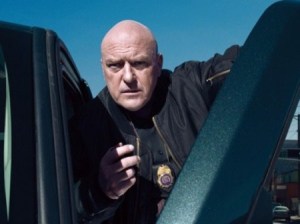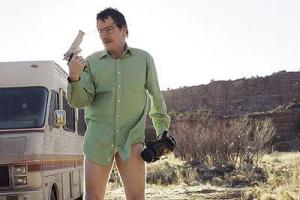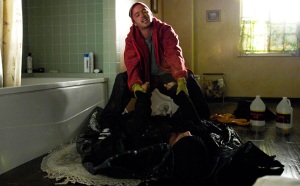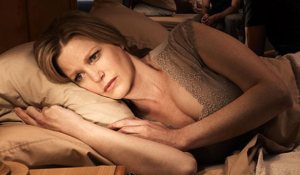
The writer and cast of Breaking Bad (HBO, 2008-13)
Dear friends and readers,
As I’m six years late for this Breaking Bad (a regional southern Virginia phrase meaning “raising hell” — male macho reveling?), having just watched the first three episodes of the first season a year after the fifth and final season of 16 episodes in 2014 brought this mini-series to an end; I see nothing wrong in photos of writer, cast, director, whoever is connected to the film as a frame for an opening blog on the first 3 of 7 episodes of the first season. Belated as this will be, as I proceed through the series my remarks may perhaps some interest as I am not going to go for awed wild screams of praise (such as I find everywhere on various sites).
I was absorbed by the opening three episodes; I recognize, appreciate, respond to quality TV when I see it: high production values, intelligently naturalistic script, verisimilitude and local accuracy in the small things (just like in costume drama), subtle intelligent acting, cinema like camera work, the latest things in film are there. As important, this series has become a sociological event: enormous numbers of people have watched and talked of it and praised it too. So it’s worth it to watch and try to think about the first and second season, and at least begin the third, which I may stop at, as (from the descriptions) the episodes become wildly physically as well as deeply emotionally violent. No need for recaps (see thorough retelling on wikipedia).
The motivating cause is quietly intensely significant as the cancer epidemic (and all the horrors in pain and humiliation that cancer brings) is known everywhere even if the news media stalwartly will not bring it out in the discussably open. Equally misery-producing are the extravagantly exploitative charges people are pressured to pay for medicine; and while in the last year it seems there will be a respite through the Affordable Care Act, the medical establishment, drug industry, corporate industrialism (protecting its right to pollute the environment if their huge profits call for it) are going to keep costs as high as they can. So Walter White (Bryan Cranston) in his forties is diagnosed with inoperable lung cancer and has not sufficient insurance to pay for treatments, much less leave his family, which includes Walter Jr (R.J. Mitte)a son with cerebral palsy, Walter Jr, and Scyler (Anna Gunn) a pregnant wife with any assets to getting on in a hard world with.
A many year under-appreciated chemistry high school teacher, White decides to make money by making and selling drugs (meth is the going abbreviation).
As can be seen in this early shot of him after an initial disaster has landed him in the desert, he is a Casper Milquetoast type who quickly finds himself in over his head in trying to cope with Jesse Pinkman (Aaron Paul), an ignorant, coarse, ruthless self-destructive, stupid ex-student of his become drug addict and seller himself and the drug dealers to whom they mean to sell their product. Jesse fails to understand that chemistry knowledge tells truths about products and a plastic container of the type White wanted Jesse to buy could have been used to dissolve a corpse while his home bathtub dissolves along with said corpse, its flesh, blood, waters.
Scyler has refused to (paraphrasing Walter) “get off his ass,” and her talk has led her nosy sister, Marie Schrader (Betsy Brandt) to think Scyler’s son is smoking marijuana; when Scyler sees her hitherto mild-mannered husband whose idea of a joy happiness seems to be a surprise birthday party given him by his family, has not come home for several nights in a row, she jumps to the conclusion he is smoking marijuana. She enlists her brutal brother-in-law, cop, DEA, Hank Schrader (Dean Norris). She immediately (no shriving time allowed) threatens to leave Walter.
Meanwhile out of fear and casting aside his better impulses to save an articulate sympathetic sensible sounding drug-seller, White strangles a second drug dealer. After he disposes of the body far more efficiently than Jesse did, he returns home to tell his now suspicious wife that he has lung cancer and what he is going to do about it.
End of half of season 1.
Why is the reader not asking, is this not perverse? The last thing the action swings around is Walt’s cancer; the only person he tells is the man he strangles whose calm sensible mind immediately sees the connection between this dread disease, money and meths. We have but the briefest scene of diagnosis — an in ambulance which takes Walt form his part-time second job in a garage where he fell suddenly to the hospital, from which Walt goes home as quickly (spending as little) as he possibly can.
This film is enacting (as its title suggests) the inward and outward violence of US life as continually acted out by aggressive and desperate males. It’s not (as yet) Quentin Tarintino stuff, but the violence of real life. The violence is of the implicit bullying sort, and also close to the surface, it’s easy to bring it to the fore and make people act on it; a kind of continual abrasive atmosphere exists. Just that menace from men of a certain kind all the time and not far from the surface. Women in the US too. Yes it is obviously an implicit inditement of US society: we see how little teachers are valued, how little they are paid. Mr White is devoting his life to a subject he loves and knows a lot about, and the irony is for the first time he is turning it to account — cooking meths ever so expertly.
The violence is sexual — our Casper Milquetoast is not just a virile male from the get-go (pregnant wife) the first episode ended with him buggering his pregnant wife and her enjoying it. Take it from me, it hurts backwards, a lot. Her birthday present to him is to lay beside him in bed, he at rest, doing nothing, while she jerks him off under the covers (while browsing the internet). The voice-over commentary on the DVD of the first season is mostly frivolous, but here and there are some revealing features: the men all laugh at the actresses’s acquiescence in the sexy enacted on the screen. As I remarked, the wife’s snitching and pressure tactics makes the point that wives are a pain in the butt; her wrong guesses show her naive ideas about what drugs people take.
The series is racist — perhaps consciously so. Walter White is Mr White, the white man. Jesse Pinkman, he’s pink, the flesh-colored crayon in a child’s crayon box in the 1950s. The drug dealers are of course dark-skinned, eyed, Spanish speaking. The racism never goes away. The series takes place in New Mexico; across the border are these Mexicans who are animal-like. All are struggling for power and the whites have the big advantage.
It’s continually funny at times too. House of Cards has humor too, but it’s witty, sardonic lines, ironical speeches. Breaking Bad is more in the mode of the action coming near to be clown like — a weird black optimistic even sort of humor — as the two men work hard to haul a dissolving body through a broken ceiling, or they stumble and fall over the filth they create. Aaron Paul is especially hilarious – the character is so unself-consciously ludicrous with his gestures of pride, his self-esteem, his complacency as he smokes pipes of meth. The humor built up and Episode 3, the most murderous, was the funniest.
It’s important to see how Breaking Bad relates to British quality TV products too. It’s politics are as reactionary in that it has no acknowledgement there is such a thing as political thought or ideas in life. House of Cards and Downton Abbey both realize the stories are taking place in a larger political context. The difference is Breaking Bad simply has no outer political world, no perspective. The Brits give us reactionary Toryism (Fellowes) or desperation and pessimism from a humane standpoint but just as paralyzing (Andrew Davies in this case); the Americans give us nothing, a vaccuum. In Downton Abbey we are in a fantasy land of benign aristocracy (how they never were), in House of Cards we sidle along the corridors of high power.

Dean Norris as Hank Schrader, White’s brother-in-law, cop (from a later season)
Breaking Bad — there are only the brutal police, more violent and with more impunity than anyone else. We are with the lower middle class and desperate working people who are policed. No NAFTA, no congress, no political or civic or human rights. We have to remember that the reason for the show is the advertisement; the program is filler in whose ideology is not allowed to be different from the ideology of the advertisement. No one is allowed any ideals to help them out of their mess at all; yes the family should hang together — literally as well a figuratively.
I am told the mini-series pulls you in as it goes, you become involved in the characters and the story takes telling, intriguing turns. Does it do more than the crude exposure of the monetary and sexual terms of the suffering (for they do suffer) male hegemony. Well I will try the next disk from Netflix, another 4 episodes to see.
Ellen
P.S. Among the good books to read on quality TV: Quality TV, edd. Janet McCabe and Kim Akass, subtitled: contemporary american television and beyond. It has an excellent essay by Sarah Cardwell in it.




NIck: “Fascinated to read your comments as always Ellen but especially on this which I have not watched yet – like you I am usually years behind. But I would challenge the UK/US political divide – The Wire was political at a level way beyond any UK drama. Incidentally I am watching The Good Wife at the moment – nothing extraordinary but consistently interesting at both a sociological and personal level; certainly worth a go (low explicit sex/violence count though both present off-screen). Oh and genuinely moving sometimes too – as any good legal drama should be.”
Since I watch very little popular TV, and trust your views, I’ll offer the explanation that Breaking Bad is then over-rated. I have read The Wire has genuine and decent political perspectives. I’ve not heard of The Good Wife. I should say the reason I don’t want popular quality TV — except when it comes in movie form — are the commercials. Now Jim is gone, I do put on the TV and am not a snob. I tried to watch Johnny Lee Miller in Elementary, and gave it up. It was so larded with commercials i could not get immersed. I could only watch The Wire say by renting a DVD of the season and at the time I didn’t belong to Netflix.
And I’ll qualify what I said about British TV: documentaries in the UK are often fine, and have a humane far-seeing perspective (without being explicit). In the 1980s quality TV in the UK was good too, and anti-Thatcherite; the people running these organizations are now subThatcherite types themselves it seems. I will watch the next 4 episodes of Season 1. The violence is controlled. But I won’t carry on past Season 2 probably …
On your second comment: Good TV, not the same as quality. Quality TV can be bad TV — sometimes Downton Abbey is very bad in its message. Good TV is also something that entertains, is absorbing, entertaining — Breaking Bad is that; I didn’t do justice to the characters, especially Mr White (it’s got to be an ironic name). Quality TV can be boring and that’s bad too: I find Games of Thrones is quality TV but it’s dull, unoriginal, just something to watch for the lovely scenery and costumes.
Let me second the recommendation for The Wire. I’d love to read your take on the series since you live near Baltimore. It broke and re-broke my heart with its reminders of our shared human feelings. I dropped Breaking Bad because it seemed to glorify & exploit & the writing got worse and worse.
As everyone says though, Baltimore is separate worlds — beyond that I live what is far away: I’m on the other side of the Beltway and in a little enclave that was originally intended to be American-Anglo in looks. Many years later it does not: the renovations of the houses put a stop to that.
I’m glad I’m only renting Breaking Bad — it does seem as if it’s way over-praised — I suspect because it’s about being manly in desperately aggressive ways and feels sorry for the men led to be this way so we are to feel for them … I can foresee the brother-in-law will have a big role this way too … Tough cop who is tragic soul?
Glorifying money-making corruptly too.
It’s a mirror of real American values — and maybe anguish. The comedy is peculiar because there is something upbeat about it.
“I just felt there was too much gratuituous violence. Maybe it isn’t gratuitous. Maybe high school chemistry teachers really get into killing quickly. And I felt the same way about The Sopranos. Oh, we just have to kill these people or we will get caught. Diane K
“Oh, we just have to kill these people” is just what American foreign policy could seem to be (drones anyone?). I recommend Bob Dixon’s analysis of boys’ adventure stories in the UK and US: http://www.peace-workshop.freeuk.com/Empire.htm The question is, are the film-makers critiquing this violence or reveling in it. The depiction of sexuality, racism, and lack of any political perspective makes me think it may be reveling. The writer is aware of how Mr White is humiliated — in the voice over commentary he comes back to that: that’s male pride. Maybe the program was overpraised in the same way the books Dixon describes (a number of modern ones are at the close) are overpraised.
Arthur: “Dear Ellen, do you mean that Downton is not popular TV?”
Me: I guess I meant “popular” in the special sense of not being perceived as elite. Downton Abbey and House of Cards have marks of elitism: the upper class characters, British characters (automatically almost), pastness (historical fiction films are perceived as elitist if they seem accurate). Lots of swear words make something “popular.” I see I am using the word in a class inflected sense.
Arthur: “I was about to say that the domestic and American popularity of DA is regularly puzzled over in The Guardian and its ilk.”
Me: Well there is a parallel between Downton Abbey and Breaking Bad: both watched by huge numbers of people, wild screams of praise by some; they are what Truffaut called “sociological events” so it doesn’t matter if the film is good or bad, quality or trash. Here’s a difference which I would account for as a reverse or back-handed snobbery. No one puzzles over the popularity of Breaking Bad — because it presents itself as popular in the sense I used (so not offensive to class injuries) and I think enacts the modern macho norms (awful in my and Bob Dixon’s view). Meanwhile the Guardian itself has marks of elitism. I read the Guardian – Jim used to each morning look at it.
Robert M: I was hooked after a few episodes and couldn’t imagine not watching thew whole series, but I can see the sense in your approach. I only got to see the seasons 5 and 6 just before Xmas, so re-watched seasons 1 – 4, and I can still feel the buzz. Look for ward to reading your further comments.
Me: It is astonishing to call it the greatest TV series to date; to my mind it suggests some emotional investment you have in it. There was some remarkable US TV in the 1950s (I remember watching Marty) and has been some remarkable TV since the 1980s, e.g., when British commercial film collapsed and you got on TV My Beautiful Laundrette and High Hopes, some of Andrew Davies’s work in the 1990s.
Robert M: I’m just talking loosely as an average punter, not as anyone with expert knowledge.Let’s say it’s the best TV series I’ve ever seen, or the one I enjoyed most. The best British TV drama I’ve ever seen (the one I enjoyed most) was the Buddha of Suburbia, even better than Dennis Potter’s best stuff. PS Like Nick I am watching the Good Wife and agree with his / her rating. In a way run-of-the-mill (and for my taste sometimes too biased in a party political way) but great characters, involving plots and as ever brilliant acting.
Joelle: “Wait till you get deeper into it, Ellen– I think a lot of the praise comes not just from the acting but from how tightly it is constructed–every detail matters & gets resolved in one way or another over the arc of the entire series.”
A friend suggested — rightly — that I am underestimating the class of these people, not recognizing it. That’s because to me they are uncouth — all but the central male and I gather he degenerates – that’s what I’d call it if he moves into a life of drug making, dealing, and killing to back his business up. They have big lovely houses; they run fancy parties to which others want to come; a job as a top police officer takes college education and savoir faire within groups of people. I didn’t catch what was Jessie’s background (maybe this comes out later) but i though him lower middle for the same reason: ignorance. I wrongly identify education with upper class as well as money showing my own self-flattery. Because I and Jim had an education. And studies show repeatedly that the characters on most TV shows in the US are two notches above the average viewer — it’s a dream fulfillment machine with all these people behind their desks. Women are shown in lower occupations much more than men (as protagonists). So it is in class the equivalent of the types we see on the British TV mysteries series. I’m not part of this American world so I misconstrue it. It does send people to congress and high power too.
It was also suggested that White has homoerotic feelings for Jessie later in the series and his buggering his wife is a sign of that. As to anal intercourse, I have seen a figure repeated — sex surveys are dicey because people pose but FWIW — it’s said 80% of white men bugger their white wives. Why the racial adjective? It’s said too that a very high figure of black women will not allow their men (husband, boyfriend whatever) to bugger them. It’s a submissive role, the catamite the Romans called men who submitted. I’ve not seen the later episodes as yet so it may be as you say homoerotic between Walt and Jessie (on Walt’s side) and I instinctively feel the desire to bugger someone shows a taste that could go homosexual in a man, but statistic insist not. In war soldiers of all kinds rape women backwards; it’s sadistic is what it is, getting pleasure out of a sense of pain and exerted power over the woman. That was not portrayed in White’s face at the close of episode 1 of course, and we were to believe his wife was enjoying it.
I know it’s sort of surprising how I can like Downton Abbey and hate the politics — I think I’m in love with the characters and some of their warm relationships — that shows something about me — maybe as you say you are gripped by the charcters of BB, but as I’ve only just begun the series I have hardly gotten to know them as the mode is to be crude lest part of the audience be intimidated away. British TV doesn’t worry about that; they worry a lot less about offending parts of their audiences.
“On commercial TV, I watch, and enjoy, The Good Wife, Elementary, and Person of Interest (though POI gets too convoluted sometimes). We DVR these shows and FF through the commercials. The Wire is extraordinary; at first we used the closed captions because of the argot. Treme had a great first season. Dark forces in our country, in human nature — I’m glad when TV digs deep that way
Kate Bernadette Benedict